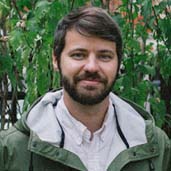- HOME
- STORIES
- Graduate Programs
- word cafe
- MFA Fiction Alumnus and Founding Editor of Long Day Press Joshua Bohnsack Discusses Long Day’s Origins
MFA Fiction Alumnus and Founding Editor of Long Day Press Joshua Bohnsack Discusses Long Day’s Origins

By Joshua Bohnsack
MFA Fiction Alumnus
I started a press by accident. After completing my undergraduate degree at the University of Iowa, I was restless and wanted to make something. I used this energy as an excuse to publish a few friends, to learn about book design, and maybe to prove my English and printmaking bachelor's degree was useful. Long Day Press came to be by channeling creative impulses and has since become a small platform to writers working in small forms.
I didn’t know how publishing worked. At the time, I’d unsuccessfully submitted to a few literary journals, but that was the extent of the industry side of books. I noticed my friends were not publishing their work, either. I’d read and offered feedback on early drafts, a lot of it good writing, but couldn’t understand why they were anxious about submitting their work. My solution was to start a project to publish their writing.
I had been making notebooks from scrap paper and discarded 6-pack holders at my bartending job. These notebooks were small enough to fit in my back pocket, so I could write down ideas while I was working. I recruited a friend to design a publication in a similar style, and convinced a local brewery to donate beer boxes to use for the cover. This resulted in a pocket-sized, hand-bound journal that I sold at a book fair in my college town.
While applying to graduate school, I began substitute teaching at a high school in rural Illinois and had a lot of free time. I found a couple who trusted me with their chapbook manuscripts. While playing a traffic video on repeat for drivers ed students, I dove into editing the manuscripts. I taught myself InDesign to lay out the pages myself, and printed out copies in the school library, resulting in two more handbound publications. By doing it myself, I could make these small books affordably, and therefore sell them at a lower price.
Moving to Chicago, I started the MFA program at Northwestern in the School of Professional Studies and found myself working for a bookstore in the back corner of a downtown food court. The bookstore was partnered with a trade publishing house, of which I started taking over the daily operations. I learned a great deal about how (and how not) to run an independent press.
My friend Joe Demes came on to help me run Long Day. Our reading preferences were similar and we put out a few more small hand-bound books. When turning to Long Day Press projects, I was excited to be working on strange little books that didn’t fit the trade paperback focus of the other press, let alone mainstream Big-5-style publishing. We debated what we wanted to bring to readers until we found our niche: novellas.
Since coming to Chicago, I had done most of my reading on the el train, and out of practicality, gravitated towards smaller books. Why couldn’t we focus on that? Were people writing them? The novella as a medium is celebrated in other parts of the world, such as Latin America. Why not here? We opened submissions and it became obvious that people actually were writing novellas, there just wasn’t much of a market for them before. It didn’t seem commercially viable, but we were having fun.
When we were sent a manuscript for What’s on the Menu? by Chase Griffin, Joe convinced me we had to publish it. Griffin’s strange novella was just the offbeat, darkly comedic literary manuscript we were looking for. It set the tone for the speculative, hybrid, and “experimental” direction in which we wanted to take Long Day. Given the size of the book, our standard booklet design wouldn’t be feasible. Using a friend’s resources, we were able to access book-making machinery and bound 100 copies of the novel on green paper with a glow-in-the-dark cover we screen-printed in my basement. The print run sold out, and for all of our titles, we adjusted to a print-on-demand system, allowing us to better serve our authors by keeping their books in print and bringing their work to more readers.
In the ensuing years, we’ve put out a few more books, mostly novellas and short-short story collections, as well as a pilot screenplay. Bessie Flores Zaldívar, Shannon McLeod, João Reis, and others have worked with us on projects they thought couldn’t be published because of their manuscript length. We have a few more new books lined up this year, as well some reissues of out-of-print novellas.
The chapbook is a form that poets have benefited from for hundreds of years, but on the whole, the form hasn’t been extended to the prose writer. With Long Day Press, we hope to give writers a space to publish that little book before the “big” book, or to house that off-beat, awkward-length manuscript. Nearly ten years since putting together a small collection of friends’ writings, we’re still trying to publish the unpublishable. We want to give readers portable literature, despite what the market says.
